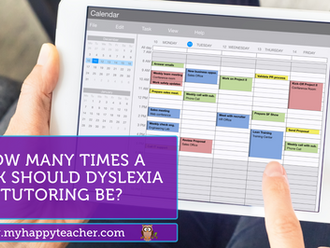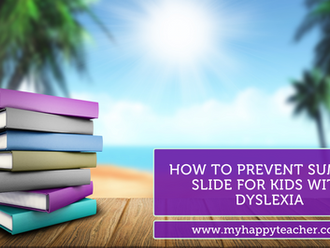top of page
Search


10 Best Books for Kids with Dyslexia: Empowering Stories to Build Confidence and Embrace Strengths
Struggling with dyslexia can feel isolating, but the right books can help kids feel understood and empowered. Check out our top 10 picks.
6 min read


What Changed in the 2025 IDA Dyslexia Definition, and Why Does It Matter?
In 2025, the International Dyslexia Association released its first new dyslexia definition in over 20 years. The update expands how we understand reading challenges—highlighting language, emotions, and individual differences. Learn what changed, why it matters, and how it can help schools and families better support every learner.
7 min read


A Parent’s Guide to Understanding the Types of Dyslexia and How to Support Reading Success (Revised in Light of the New 2025 Definition of Dyslexia)
Not all dyslexia looks the same. Some children struggle to sound out words, while others can read them but not remember them. Understanding the four main types of dyslexia — phonological, surface, rapid naming, and double deficit — helps parents identify what their child is experiencing and how to support them with empathy and evidence-based strategies.
10 min read


How Many Times a Week Should Dyslexia Tutoring Be?
For children with dyslexia, steady and consistent tutoring is key to real progress. Even with today’s busy schedules, experts in Wilson and Orton-Gillingham approaches recommend two to three lessons each week. This frequency provides the repetition, reinforcement, and intensity children need to strengthen reading skills and build lasting confidence
6 min read


Old vs. New Dyslexia Definition Explained: A Parent’s Guide to the Proposed 2025 Update
For the first time in more than 20 years, the International Dyslexia Association has drafted a new definition of dyslexia. The way we define dyslexia affects how schools identify students, provide support, and create policies. This article breaks down the old vs. new definition of dyslexia in clear, parent-friendly language so families can understand the changes and share informed feedback.
7 min read


The Ultimate Guide to Writing a "Dear Teacher" Letter for Your Child with Learning Challenges
A “Dear Teacher” letter is a thoughtful way to introduce your child, highlight their strengths and challenges, and build early connection with their teacher. This blog post walks you through how to write one—and includes free, customizable templates to make it easy.
7 min read


Help Your Child Overcome Reading Struggles with a Certified Online Dyslexia Tutor Using the Wilson Reading System
Does your child struggle with reading, despite all your efforts to help? Learn how a certified online dyslexia tutor using the Wilson Reading System can build your child’s confidence, improve reading skills, and make learning feel possible again.
7 min read


How to Prevent Summer Slide for Kids with Dyslexia
Worried about your child losing reading progress over summer break? The "summer slide" is real—especially for kids with dyslexia—but it's preventable. With the right mix of fun, structure, and support, your child can maintain skills and even grow in confidence. This post is full of simple, creative ideas to keep learning alive all summer long.
4 min read


How to Build a Summer Reading Routine for Children with Dyslexia
Looking to make reading a positive part of your child's summer? This post shares simple, effective tips to help children with dyslexia build a routine that boosts confidence and makes reading enjoyable. Whether you're starting from scratch or looking to improve an existing habit, you'll find practical ideas to support your child all summer long.
6 min read


Is Weak Working Memory a Learning Disability? A Parent’s Guide to Understanding the Signs and Solutions: What Is Weak Working Memory—and Why Does It Matter?
Does your child struggle to follow directions, remember steps, or stay organized? These may be signs of weak working memory—a challenge that affects learning but is often overlooked. In this post, we explain what working memory is, how it impacts school success, and practical ways parents can help their child thrive.
6 min read


How Gathering Evidence Strengthens Your Special Education Advocacy
Discover how gathering evidence boosts special education advocacy, plus practical tips on capturing meaningful insights.
6 min read


How Dyslexia Affects Self-Esteem: Building Confidence in Children
Struggling with reading can deeply affect a child’s confidence, especially for those with dyslexia. This blog explores how dyslexia impacts self-esteem and offers practical tips to help kids feel capable and supported. Learn how to boost confidence with strategies that celebrate strengths, encourage progress, and create safe, uplifting spaces at home and in the classroom.
5 min read


Who Diagnoses Dyslexia? A Comprehensive Guide for Parents
Wondering who diagnoses dyslexia? Our blog covers the process, signs, and resources to help your child get the right support.
14 min read


How Assistive Technology Can Help Your Child with Dyslexia Thrive in School
Unlock your child's potential with curated Dyslexia tools. Visit our blog for effective accommodations and strategies to support learning.
7 min read


Growth Mindset For Parents: How You Can Influence Your Kids to Develop A Growth Mindset
Help your kids thrive with a growth mindset! Discover tips for parents to encourage resilience and learning. Read more on our blog.
4 min read


Understanding Dyslexia: A Comprehensive Guide Across All Ages, From Childhood to Adulthood
Understanding dyslexia: Recognize signs, and help children thrive with our comprehensive guide for parents and teachers.
21 min read


Checklist for Identifying Working Memory Weaknesses in Children
Learn about working memory weaknesses in children, why it matters, and how to recognize if your child might be struggling with it.
5 min read


What Is a Dyslexia Screener? Key Facts Every Parent Should Know
Learn about dyslexia screenings and the next steps if your child is found to be at risk. Read our blog for essential insights and guidance.
7 min read


Empowering Dyslexic Students with Wilson Reading: a Research-based, Systematic, Multisensory Program
Worried about your dyslexic child's reading struggles? You're not alone. This parent’s guide explores how the Wilson Reading System, a proven, research-based method, transforms reading for dyslexic learners. Discover real success stories and learn how you can play a vital role in your child’s reading journey. Empower yourself with knowledge, tools, and hope, because your child can thrive.
10 min read
bottom of page